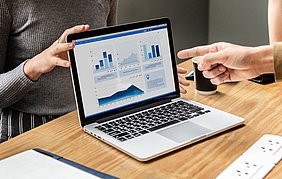In the Fiware4Water project, interfaces and tools were developed to connect the water sector to the FIWARE platform. Four demo cases in Europe were used to demonstrate various applications.
FIWARE is an open IT platform created under the Public-Private Partnership Program on the Future Internet (FI-PPP) launched by the European Commission in 2011. Since its inception, this community has evolved and is now a global ecosystem of developers, innovation hubs, accelerators, cities, SMEs and start-ups. It facilitates the development of innovative digital solutions.
In the water sector, IT development of applications and management tools with Big Data is quite late, especially as it is a very fragmented sector and the problems of system interoperability, data standardisation, semantics and format exchange remain.
Within the project, data models and interfaces were developed to combine and process different data streams and to transfer them into a standardised output. This forms the basis for improving the operation as well as the development of decision support tools (AI models).
In the project, the application to the entire water cycle could be demonstrated:
- Water supply system of the city of Athens (GR),
- Drinking water supply system of the city of Cannes (FR),
- Amsterdam wastewater treatment plant (NL),
- Smart meters for the citizens of Cranbrook (UK)
TZW worked on several subtasks in the project:
- Lead of work package 1 (FIWARE4Water user requirements).
- Testing of two multiparameter probes for the detection of water quality. The probes were developed by the project partners CNRS and EUT and were tested under practical conditions in a model of a drinking water distribution network at the Dresden site. In addition, an improvement in the measurement accuracy was achieved through suitable processing of the raw sensor data.
- Development of a procedure for automated event detection in time series of water quality sensors. The developed models were successfully applied and validated on data from online sensors from the drinking water supply network of Cannes (FR). The procedure is based on univariate and multivariate methods to detect possible sensor malfunctions as well as water quality changes.

![[Translate to English:] Prüfstelle-Produktprüfung_Teststand Test centre and product testing](/fileadmin/_processed_/0/9/csm_TZW-Karlsruhe_Pruefung_Geraete-Teststand_377188946c.jpg)
























